| Srl | Item |
| 1 |
ID:
127940
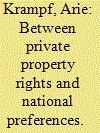

|
|
|
|
|
| Publication |
2014.
|
| Summary/Abstract |
The history of the Bank of Israel is often told as a story that leads from servitude to independence. According to this conception, the bank was a weak and marginal institution during the developmental period of the state, and it turned into an independent actor in the neoliberal period. This article argues that the portrayal of the bank as marginal during the developing period fails to recognize the essential role it played in contributing to the capacity of the state to allocate credit more effectively. It maintains that that Bank of Israel provided the state with market compatible instruments in order to govern the banking system and depoliticized the allocation of credit. The establishment of the bank had two effects on Israel's political economy: it enabled the government to weaken its dependence on the Histadrut as an agent of development and it allowed it to nurture linkages with the private sector.
|
|
|
|
|
|
|
|
|
|
|
|
|
|
|
|
| 2 |
ID:
192624
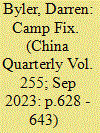

|
|
|
|
|
| Summary/Abstract |
Industrial parks in north-west China occupy a liminal space between labour camps and private industry. Drawing on worker interviews, government documents, industry materials and images this article shows that for-profit public-private industrial parks have been built as part of a “camp fix” mechanism centred on detaining and “re-educating” Uyghurs and Kazakhs at the periphery of the nation. It argues that these industrial parks concentrate forms of repressive assistance and “dormitory labour regimes” that operate at other frontiers of Chinese state power and point these strategies of disempowerment towards a seemingly permanent, ethno-racialized underclass, producing a “re-education labour regime.” It further argues that the material infrastructures of these surveiled and policed spaces themselves are productive in enforcing the goals of the “camp fix”: the creation of high-quality, underpaid, docile and non-religious Muslim workers who are controlled through the built environment.
|
|
|
|
|
|
|
|
|
|
|
|
|
|
|
|
| 3 |
ID:
186945
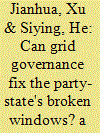

|
|
|
|
|
| Summary/Abstract |
Grid governance has been developed by the Chinese party-state to collect intelligence at the grassroots level for the early pre-emption of what it defines as social instability. Using data collected from four months’ participant observation and extensive interviews with personnel who work in the grid governance system in what we call W Street, a location in a second-tier city in southern China, this paper examines how China's grid governance is used for stability maintenance and how in practice the system has become alienated from its original purpose of social control. We find that grid governance is achieved mainly through three mechanisms: intelligence gathering, case coordination and real-time reporting for stability maintenance. We further reveal that while grid governance provides an important infrastructural power for intelligence gathering, the realization of this power could be hindered by contradictory logics among different levels of government. This research not only provides empirical data on how China's grid governance works in practice but also calls for a rethinking of the capacity of China's stability maintenance regime.
|
|
|
|
|
|
|
|
|
|
|
|
|
|
|
|
| 4 |
ID:
158920
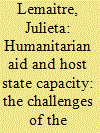

|
|
|
|
|
| Summary/Abstract |
How can humanitarian actors operate in a host state with significant subnational variations in willingness and capacity to meet its obligations? This is an issue of pressing importance, given the expansion of humanitarian aid to middle-income countries with growing state capacity, but with persistent infrastructural weakness in their periphery. The article illustrates the challenges and potentialities of engaging these states through the case study of the Norwegian Refugee Council (NRC) in Colombia. It describes the way the NRC has located its offices in peripheral areas, and how its activities have fostered the rule of law, successfully using rights-based approaches to strengthen subnational state institutions, activate and mobilise citizen demands and bridge national and subnational administrations. The article concludes that these activities, operated by officers with extensive practical knowledge and local trust networks, can open the way for durable solutions for humanitarian crisis, but can also provoke backlash from subnational actors.
|
|
|
|
|
|
|
|
|
|
|
|
|
|
|
|
| 5 |
ID:
159560
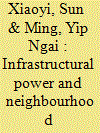

|
|
|
|
|
| Summary/Abstract |
This article examines the capacity of China to adapt in the face of the political and social challenges brought about by economic reforms, and argues that the regime's resilience lies in the state's capacity to establish infrastructural power at the urban grass-roots level. The 1980s was an invaluable historical period, which witnessed the early stages of the economic reforms and the Chinese state experimenting with ways to adapt to the emerging challenges. As the danwei (work unit) system weakened, the state rebuilt the logistical infrastructure by means of handling burning issues, accumulating resources for expanding welfare coverage, facilitating residential-based grass-roots administrative networks, and consolidating its power through building institutional infrastructure for urban governance.
|
|
|
|
|
|
|
|
|
|
|
|
|
|
|
|
| 6 |
ID:
187419
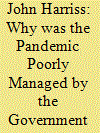

|
|
|
|
|
| Summary/Abstract |
Administrative “success” or “failure” during the pandemic are hard to assess given uncertainties both of criteria and of data. But there can be no doubt about the mishandling of the pandemic at crucial junctures by the Indian government, or about the culpability of prime minister Narendra Modi himself. He has this in common with other “strongmen” of contemporary world politics, but Modi was unusually successful in turning the events of the pandemic to reinforce his dominance. The immediate political factors that influenced the Indian response had to do with political leadership and with the “decisionism” that characterised Modi’s actions, but in the context of the pursuit of the goals of Hindu nationalism. This article explains the responses of the Indian government drawing on a framework based on the comparative analysis of Baum and her co-authors. It shows how the events of the pandemic reflect on India’s politics and on the character of the Indian state, using a state-in-society approach suggested by the interlocking arguments of Migdal, Mann and Evans. This highlights and explains the very different responses of the major states of the country.
|
|
|
|
|
|
|
|
|
|
|
|
|
|
|
|